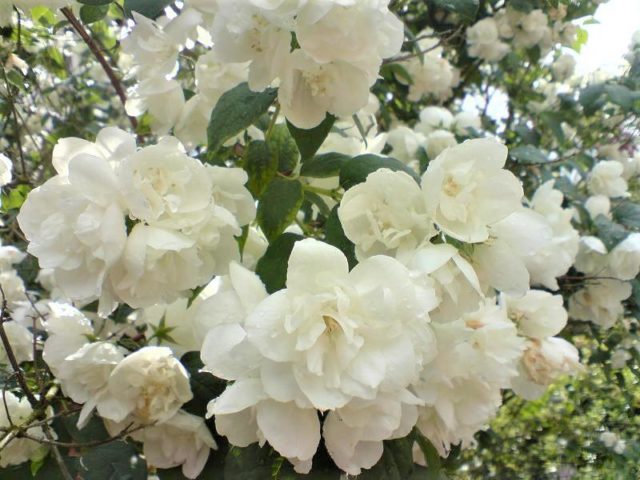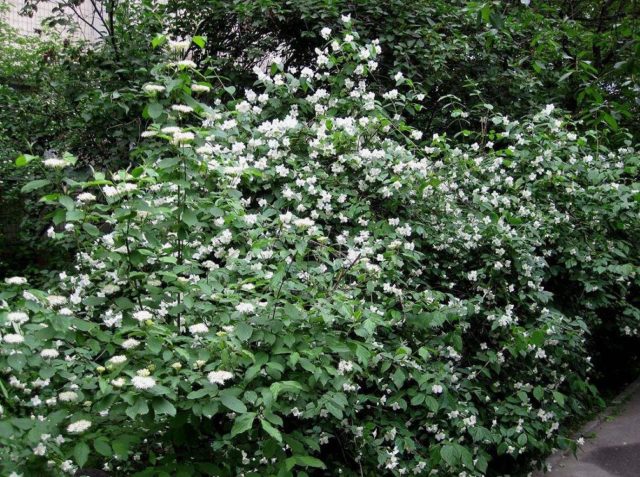Content
Terry hybrid of a new generation, Chubushnik Shneeshturm belongs to ornamental shrubs of European selection and is translated as "blizzard", "snowfall". For its pronounced aroma, fragrant with sweet notes, it, like many varieties of chubushniks, vaguely resembles jasmine. Therefore, among the people, the name of garden jasmines was stuck behind them. But from a botanical point of view, this is wrong: these cultures are completely different.
Description of the crown chubushnik Schneersturm
Chubushnik Corona Shneesturm (Schneesturm) is a powerful, high - up to 2.5 - 3 meters - deciduous shrub with thin weeping branches that fall from the outside of the crown. A bush with many trunks and a dense, oval crown resembles a fountain in its shape. It grows very quickly, with an annual growth rate of 45-50 cm in height and 20-25 cm in width. The rich, dark green foliage of garden jasmine fading by autumn and acquires a yellow color. Leaves 7 - 9 cm long have a simple, pointed-oval shape.
How jasmine Shneesturm blooms
A truly delightful sight can be enjoyed during the flowering of the Schneeshturm variety. Large, about 5 cm in diameter, white double flowers abundantly cover the flowing shoots, completely covering the green foliage. Flowers collected in a brush are formed at the ends of short young shoots. 3 - 5, and sometimes 7 - 9 pieces each, they are planted in the brush so close that they visually resemble huge, loose snowballs. Therefore, during the flowering of jasmine Shneesturm, the illusion of a bush swept by snow flakes is created. It blooms at the end of June and pleases the owners of garden plots with its splendor for 20 - 25 days.
Delicate and incredibly romantic flowering of the Schneeshturm variety is accompanied not only by an abundance of numerous snow-white flowers, but also by the fragrance of a delicious delicate aroma, similar to the smell of real jasmine. That is why mock-orange is called “false” garden jasmine. The duration and splendor of the flowering of the Chubushnik Shneesturm is influenced by the correct agricultural technology, a place suitable for active growth and development, and timely pruning of the plant. So, in the shade and partial shade, the branches of the chubushnik stretch out and weaken, which makes the flowering meager and short-lived. In the photo of the chubushnik Shneesturm, you can appreciate all the splendor of a strong, developed shrub at the very peak of its flowering.
Main characteristics
This unpretentious and hardy hybrid of the mock-orange Shneesturm takes root well in almost any climatic conditions. It blooms in the 3rd - 4th year after planting. The shrub is frost-hardy - it can withstand frosts up to 25 degrees. The Shneeshturm variety is practically not damaged by pests and diseases. But with waterlogged soil and a shaded location, garden jasmine weakens, losing its natural resistance to pests and diseases.
A video about the varietal characteristics of the Shneesturm chubushnik will allow you to learn in maximum detail and clearly about all its features
Breeding features
New copies of the Shneeshturm hybrid mock-mushroom can be obtained in the following ways:
- seeds;
- green or lignified cuttings;
- layering;
- dividing the bush.
When planting with seeds, young seedlings are grown in seedling beds and young plants are planted in a permanent place only for the 2nd - 3rd year. Planting by cuttings is better suited for small-leaved, and not large-leaved mockers, to which the Shneeshturm variety belongs. Cuttings grow rather slowly and require a lot of patience and diligence from the gardener. But in the end, you can get high-quality planting material with all the properties inherent in this type of plant. The method of dividing the bushes is the simplest for propagating garden jasmine and makes it possible to immediately plant the seedlings in a permanent place. Planting in this way can be done in early spring or autumn.
Planting and caring for a chubushnik Shneesturm
Chubushnik Shneeshturm feels great in the Moscow region, which is confirmed by the description and photo of the plant. An ornamental culture, easy to plant and undemanding to growing conditions, develops well in sunny places protected from cold winds and fertile soils. The chubushnik variety Shneesturm is also responsive to regular feeding, thanks to which its flowering becomes abundant, and the flowers themselves become large, attractive. Garden jasmine does not tolerate waterlogging of soils, their waterlogging, although it has a positive attitude towards moisture in moderate amounts.
Recommended timing
Planting and replanting the Schneesturm mock-orange is best in early spring before bud break or in early autumn. In Siberia, planting is recommended in the spring, since young seedlings that have not yet had time to take root well enough in a new place may freeze in winter.
Site selection and soil preparation
The place for planting garden jasmine Schneeshturm should be well-lit, sunny, without drafts. The site should not be windy, as there are great risks of freezing of the bushes in winter. An excellent place for a chubushnik would be the south side of the house, hedges or walls of tall trees. Planting of plants for hedges is carried out at a distance of 0.5 m from each other, in group plantings - up to 1.5 m.
The substrate for planting the crown mock-mushroom Shneeshturm is prepared from humus, leaf compost, peat, which improves the structure of the soil. A small amount of complex mineral fertilizers and a little wood ash will provide the plant with all the necessary macro and microelements. If the soil on the site is heavy, loamy, sand is mandatory. The fertile substrate will keep the jasmine alive for the first few years.
You can learn more about the use of the crown mock Shneestorm in landscape design from the video on YouTube:
Algorithm landing
The Shneesturm hybrid is planted according to the standard scheme.
- Dig holes 50x60 in size.
- A drainage layer is laid at the bottom, at least 15 cm high, made of broken brick, sand or crushed stone.
- The soil from the planting pit is ennobled in the above way.
- The installation of the Chubushnik sapling Shneeshturm is carried out in such a way that the root collar remains at ground level or deepens no more than 1.5 cm. A stronger depression leads to decay of the root system.
- Jasmine seedling Schneesturm is sprinkled with fertile soil and watered abundantly.
Growing rules
When planting and caring for the Shneestorm crown mock-orange, consider:
- in the conditions of central Russia, it does not require shelter during the cold season, with the exception of winters with the forecast of severe frosts;
- tying up the gentle shoots of an adult, spreading bush of the chubushnik allows you to avoid breaking them off under the weight of the snow;
- to protect the root system of the Schneesturm hybrid from freezing out, in late autumn, the soil of the trunk circle is mulched, and additional snow is added.
Watering schedule
Chubushnik is demanding on moisture, but not on waterlogging of the soil. In drought, leaves are the first to suffer. They quickly recover after heavy watering or rains, delighting with their intense color. Therefore, watering jasmine Schneesturm should be carried out according to the following rules:
- when planting, 10 - 20 liters of water are poured onto each seedling;
- in warm, especially dry summer, watering is carried out 2 - 3 times a week, at the rate of 20 - 30 liters of water for each bush.
Weeding, loosening, mulching
Weeding of garden jasmine is carried out as needed, loosening - 2 - 3 times over the summer, to a depth of 5 - 7 cm.Chubushnik is well responsive to mulching with peat or humus, with a layer of 3 - 4 cm, which not only provides the plant with additional nutrition, but also allows maintain soil moisture.
Feeding schedule
In the first year of its life, the chubushnik Shneesturm receives nutrition from fertile soil fertilized when planting. Therefore, feeding begins to be carried out starting from the 2nd year of life. The jasmine feeding schedule looks like this:
- in early spring, organic fertilizers are applied to the ground (1 bucket of diluted mullein with water 1:10) or by mulching;
- complex mineral fertilizing is performed before flowering;
- from the third year of life, phosphorus-potassium fertilizers are applied immediately after flowering.
Pruning
Garden jasmine Schneeshturm needs regular pruning. They carry it out in this way:
- in early spring (obligatory annually) - sanitary pruning with the removal of all damaged, frozen, dry shoots;
- in the spring, if you want to create a symmetrical, dense bush, a shaping haircut is carried out with cutting off weak branches to half and lightly shortening strong branches;
- in early spring, with thickened or bare bushes, rejuvenating pruning is performed, if necessary - 3-4 years in a row. In the first year, all shoots are removed, except for the 3-4 most developed ones, leaving only 40 cm in length; in the second year, they begin to form a bush, leaving on each branch 2 - 3 of the strongest lateral processes.
All varieties of Shneesturm terry chubushnik need rejuvenating pruning, because hybrids are distinguished by rapid growth rates with accelerated development of lateral shoots. Rejuvenating pruning renews an already mature plant and gives it the opportunity to surprise its owners with stunning beauty.
Preparing for winter
Garden jasmine Shneesturm has good frost resistance and perfectly tolerates winters in the Moscow region without shelter. But young plants are still recommended to be protected from cold weather, providing shelter from spruce branches or covering material. The soil around the plant must first be mulched with fallen leaves or coniferous bark. The flexible shoots of the chubushnik are easily bent to the ground, which allows them to be guaranteed to be under the snow layer.
Pests and diseases
"False" jasmine of the Schneeshtorm variety is a plant resistant to diseases and pests. But on weakened bushes growing in unfavorable conditions, specific pests appear:
- bean aphid;
- spider mite;
- leafy weevils.
It is better to fight in the early stages of their development with natural, biological means - infusions or decoctions of herbs.If the lesion has reached a critical size, and folk drugs did not bring a positive result during treatment, fungicides are used to treat the crown of the crown Shneesturm.
Conclusion
Chubushnik Shneestorm looks gorgeous in small and large gardens - against the background of the walls of the house or as a tapeworm on the lawn area. Snow-white flakes of flowers will look spectacular with flowering and herbaceous crops, and golden foliage will add bright colors to the garden landscape design in autumn. You can use a hybrid mock-orange in group, single plantings, as part of colorful shrub and woody compositions, in hedges.










